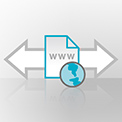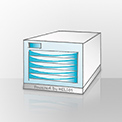- File compression methods used
- Delay before download starts
- How many HTTP requests per second can be handled?
- Directory browsing performance
- Conclusion
File compression methods used
There is no file compression used for AFP, SMB/CIFS, WebDAV, FTP and SSH FTP. Only Xinet WebNative and HELIOS WebShare use download compression. The following table shows the compression type and rate used by the different products.
The Zip (Flate) format, as used in HELIOS WebShare, has the benefit that it is already completely integrated in Windows XP or newer. Opening a Zip file is supported in the Microsoft Windows Explorer. On Mac OS 9 and OS X, Zip files are supported by the included StuffIt application. A second benefit is that Zip (Flate) compressed files are smaller than StuffIt files, resulting in faster file downloads. WebShare Zip downloads can include complete recursive folders (subfolders). WebNative does not have this capability.
| Application / Service | Compression | Fileset | Compressed | Saving | |
|
|
AFP, SMB/CIFS, WebDAV, FTP, SSH FTP | None | 141 MB | 141 MB | – |
|
|
Xinet WebNative | StuffIt | 141 MB | 125.6 MB | 10.9 % |
|
|
HELIOS WebShare | Zip (Flate) | 141 MB | 111.2 MB | 21.1 % |
Delay before download starts
This table shows the delay after files are selected for download, until the transfer starts. The delay is due to the archive creation on the server.
HELIOS WebShare does not have any delay to compress the download archive. The compression used by WebShare, built on the HELIOS “zipstream” technology, is done on-the-fly during the download. The WebShare download stream is piped from the WebShare File Server to the WebShare Webserver, and down to the Browser client, all without creating temporary files.
| Application / Service | Fileset | Download Delay | Comment | |
|
|
AFP, SMB/CIFS, WebDAV, FTP, SSH FTP | 141 MB | < 1 sec. | |
|
|
Xinet WebNative | 141 MB | 55 sec. | Tests issued on www.xinet.com WebNative Server, issued multiple times to ensure that no other user was using it. |
|
|
HELIOS WebShare | 141 MB | < 1 sec. |
How many HTTP requests per second can be handled?
The tests were performed using the “curl” or “wget” command line tool to measure the performance.
This shows the server performance and indicates that the HELIOS WebShare Webserver outperforms any CGI web server solution.
| Application / Service | HTTP Requests / sec. | Comment | |
|
|
Xinet WebNative | 1-2 | Using WebNative on www.xinet.com Internet packet delay (ping time) was subtracted |
|
|
HELIOS WebShare | 70 | On a G4 (1 GHz) WebShare Server |
Directory browsing performance
How many network packets are sent over the Internet to enumerate a directory from a remote Internet client?
The test was done after the server authorization by opening a volume and selecting a remote file without loading it. The server volume / share root directory contained about 34 folders. We used the Photoshop open file dialog to open one folder and select a file (without loading the file into Photoshop).
This clearly shows that AFP and SMB/CIFS volumes, mounted over the Internet, are very difficult to work with, due to the many network requests, which cause long delays for the clients. The Mac OS X test with 2440 packets takes less than a second in a local area network. Using a 64 Kbit network the same task would take minutes. FTP requires only 67 packets but did not include any file icons, which are displayed in all other solutions.
Using WebDAV (tested using an Apple iDisk volume), opening the volume and the first folder required about 500 packets, when selecting a file in Photoshop the machine was completely busy for minutes resulting in more than 12000 packets. This shows how inefficient the usage of a WebDAV volume with real world applications is. The test was performed using a fast 2 Mbit Internet connection.
The WebNative test was done with the “Demo INK” demo account by opening the “advertisers” folder and selecting one file for the download basket.
| Application / Service | Packets Required | Comment | |
|
|
FTP | 67 | |
|
|
AFP (Mac OS X 10.2) | 2440 | |
|
|
AFP (Mac OS X 9.2.1) | 9169 | |
|
|
SMB / CIFS (Windows XP) | 2378 | |
|
|
WebDAV | 12530 | Test done using an Apple iDisk volume |
|
|
Xinet WebNative | 970 | Test done on www.xinet.com |
|
|
HELIOS WebShare | 107 | See details |
HELIOS WebShare is the only solution with an extremely optimized protocol implemented by the HELIOS Webserver. Requiring 9 times less packets compared with Xinet WebNative means that customers will have less delays and faster responses using HELIOS WebShare.
Q: Why do Windows and Mac OS 9 & OS X use so many packets for directory browsing?
A: The Finder/Explorer window enumerates all files and meta data. This is done via some higher-level API calls which cause many low-level API calls which in turn results in network requests/packets. For example, the open file dialog enumerates the current directory as well as the first level of all subdirectories in order to collect directory and icon information. All this is done via thousands of network packets. Unfortunately, the OS vendors Apple and Microsoft are not optimizing this because it works fine on local machines and with today's local area networks and servers.
Please note: The following table gives an overview how many packets can be handled on different networks. This number depends on the packet size and network request type and is just an estimation.
This shows that an intelligent server solution is required for remote file access. HELIOS WebShare and Xinet WebNative use a Web based approach, which has the benefit that the HTML in the browser displays the file listing including icons, while requiring significantly fewer packets compared to direct volume access using AFP or SMB/CIFS.
Q: Why is WebDAV not recommended for remote file access?
A: The disadvantage of every file system based solution including AFP, SMB/CIFS and WebDAV is that, when a file system call is done via a slow network connection, no other API will go through the file system (e.g. Disk Free status) while the old request / transfer is still ongoing. This means that the system is almost locked up during a file transfer until the transfer is completed. In application based file transfers, e.g.: FTP, the browser does not lock the file system, and the transfer will not block the OS and other applications.
| Network Connection | Packets / sec. | Request Response Delay |
| 100Mbit LAN | More than 10 000 | < 0.1 msec |
| DSL Internet 768 kbit | Less than 100 | 10 msec |
| ISDN or Modem | Less than 10 | 35 - 150 msec |
Files used for the download tests
The following files have been used for the download compression tests. The same sample files from the Xinet WebNative demo site (www.xinet.com) were used for all tests. Hence, no files were optimized for the Zip download tests. The files are:
| File Name | File Format | Size | Date |
| axel2.tif | TIFF | 3 MB | Mon, 11 Sept, 2000 10:09:14 PM |
| bike.worked | 8BPS | 90 MB |
Fri, 18 Aug, 2000 11:48:31 PM |
| cover art | Directory |
Mon, 27 Aug, 2001 07:15:08 PM |
|
| Dalim LW | 132 kB |
Tue, 03 Mar, 1998 03:41:07 AM |
|
| edibible.logo.eps | EPSF | 374 kB |
Thu, 27 Jul, 2000 02:38:10 AM |
| French Pastry | TIFF | 19 MB |
Sat, 19 Aug, 2000 08:31:50 PM |
| FullPress EPS | EPSF | 401 kB |
Fri, 18 Aug, 2000 05:49:35 PM |
| originals DIR | Directory |
Fri, 18 Aug, 2000 11:03:56 PM |
|
| radiospt.edibible.7thday.wav | WAVE | 2 MB |
Wed, 23 Aug, 2000 06:10:36 AM |
| red_spot convertible.psd | 8BPS | 8 MB |
Wed, 15 Aug, 2001 07:52:57 PM |
| WebNative.eps | EPSF | 2 MB |
Fri, 18 Aug, 2000 07:03:08 PM |
Conclusion
The two-tier server concept of HELIOS WebShare represents the fastest remote file access solution available. No other solutions come close to its server performance and security. The benefit for users is that WebShare provides very fast, easy and reliable access to the file server data.
This document is subject to change. Last updated October 10, 2003
All trademarks used in this document belong to their respective owners.

 Enterprise Server
Enterprise Server
 Développeurs / SDK
Développeurs / SDK
 Industrie / Commerce
Industrie / Commerce
 Editeurs de journaux / Maisons d'édition
Editeurs de journaux / Maisons d'édition
 Photographes / Studios
Photographes / Studios
 Agences de communication / publicité
Agences de communication / publicité
 Vidéo & Divertissement
Vidéo & Divertissement
 Collaboration depuis le cloud
Collaboration depuis le cloud
 Couleur HD
Couleur HD
 Traitements d'images
Traitements d'images
 L'épreuvage
L'épreuvage
 Connectivité WebShare
Connectivité WebShare
 Automatisation de flux
Automatisation de flux
 Serveur de fichiers pour l'entreprise
Serveur de fichiers pour l'entreprise
 Communiqués de Presse
Communiqués de Presse Vidéos
Vidéos  Bulletins
Bulletins  Événements
Événements